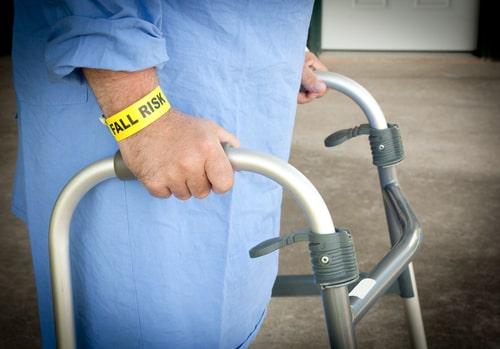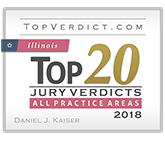UPDATE: When is a Nursing Home Liable for a Resident’s Fatal Fall Accident?
 Originally published: October 19, 2021 -- Updated: January 5, 2023
Originally published: October 19, 2021 -- Updated: January 5, 2023
Update: In addition to understanding the causes of falls in nursing homes, as discussed below, it is also important to understand the different types of injuries that can occur in these situations. Elderly or disabled nursing home residents are often in frail physical condition, and an incident that may have caused minor injuries to others may result in serious complications affecting their health and well-being. Common injuries in these types of fall accidents include:
- Broken bones - Broken hips and other bone fractures are some of the most common injuries nursing home residents suffer in falls. Elderly people often have brittle bones, especially if they suffer from conditions such as osteoporosis, and sustained fractures may never heal properly. This may cause them to experience severe pain and issues that affect their mobility.
- Head trauma - Nursing home residents may suffer from concussions, traumatic brain injuries (TBIs), or even skull fractures in a fall accident. When a person experiences diminished reflexes or does not have the physical strength to brace themselves against a fall, they may strike their head on the ground or other objects, resulting in severe injuries that may lead to permanent impairment or death.
- Internal organ damage - Damage to organs, especially the lungs and spleen, is a relatively common nursing home injury that can occur in a fall. If nursing home staff do not provide prompt medical attention after a fall, a resident may suffer from internal bleeding or organ failure.
- Spinal cord injuries - Falls are one of the most common causes of spinal cord injuries in nursing home residents. These types of incidents may lead to temporary or permanent paralysis, and a nursing home resident may experience excruciating pain, mobility issues, and other health complications.
- Severe bruising, lacerations, or sprains - In some cases, these types of nursing home injuries can cause a nursing home resident to experience long-term complications or chronic pain. These issues may also lead to other complications, such as serious infections, that may affect a person's overall health.
It is important to understand the risks nursing home residents face and the types of injuries they can suffer as a result of negligence. If your loved one has been injured in a fall accident that took place at a nursing home, the DuPage County nursing home negligence lawyers of Kaiser Law can investigate the incident and determine if a nursing home facility is liable for the damages your family has suffered. Contact us at 630-274-4400 to arrange a free consultation today.
For nursing home residents who are elderly or in poor health, something as simple as a slip and fall accident can be fatal. The World Health Organization estimates that there are nearly 700,000 fatal falls each year. If your loved one passed away due to a nursing home fall, you may be lost and unsure of what to do. Nothing can bring back your loved one or make up for your tragedy. However, there may be legal recourse available to you and your family.
Nursing Home Falls Caused by Negligent Care
Losing a loved one is always hard. However, losing a loved one in a preventable accident is especially devastating. Often, nursing home falls are preventable. A number of different issues can lead to a fatal nursing home fall, including:
-
Inadequate supervision of nursing home residents – Many nursing home residents overestimate their own physical capabilities. This is especially true of residents suffering from Alzheimer’s Disease or dementia. When staff neglect residents, they may try to get up and move about on their own without assistance from a wheelchair, walker, or staff member.
-
Insufficient upkeep and cleaning of the facility – Everyone likes a clean, clutter-free home. However, in a nursing home, obstacles and clutter can be fatal. When staff fail to clean up spills, keep hallways free of clutter, or pick up dropped objects, they can become deadly hazards.
-
Medication mistakes – Medication errors, including dosage mistakes, missed doses, and overmedication, can cause residents to suffer from dizziness or fainting. Some nursing homes even use psychiatric medications including antipsychotic medication, to purposely sedate residents. This so-called “chemical restraint” violates the Illinois Nursing Home Care Act. Sadly, the practice is still common.
-
Poor staff training and understaffing – Staff who are overworked or undertrained can make critical mistakes when transferring patients from their beds to their wheelchairs, assisting them in the shower, or helping them walk around the facility.
-
Negligent medical care after a fall – Some fall accidents become fatal because the nursing home failed to recognize the severity of the fall and take the appropriate action. If a nursing home delays medical care, a nursing home resident may die from a fall he or she would have otherwise survived.
Holding a Negligent Nursing Home Accountable
A wrongful death claim against the facility may be the best way to hold a negligent nursing home accountable for a preventable fall accident. Not only can a wrongful death claim help you seek justice for your loved one’s untimely death, it may also allow you to recover financial compensation for your damages.
Contact an Elk Grove Nursing Home Neglect Lawyer
At Kaiser Law, we believe that negligent nursing home facilities should be held responsible for their actions. Contact our team of compassionate, skilled Bensenville nursing home injury attorneys to learn more about how we can help you. Call 630-274-4400 for a confidential consultation.
Sources:
https://www.ilga.gov/legislation/ilcs/ilcs4.asp?DocName=021000450HArt.+II+Pt.+1&ActID=1225&ChapterID=21&SeqStart=4200000&SeqEnd=6300000
https://health.usnews.com/health-news/best-nursing-homes/articles/antipsychotic-use-in-nursing-homes

 630-274-4400
630-274-4400












